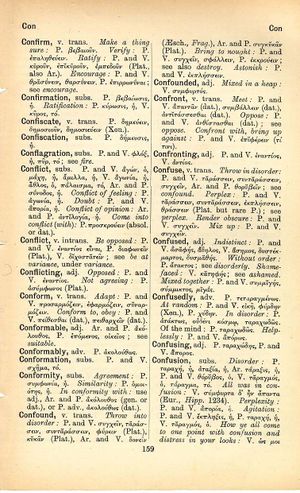confuse
ἀμείνω δ' αἴσιμα πάντα (Odyssey VII.310 / XV.71) → all things are better in moderation
English > Greek (Woodhouse)
verb transitive
throw in disorder: P. and V. ταράσσειν, συνταράσσειν, συγχεῖν, Ar. and P. θορυβεῖν; see confound.
perplex: P. and V. ταράσσειν, συνταράσσειν, ἐκπλήσσω, ἐκπλήσσειν, θράσσειν (Plato but rare P.); see perplex.
render obscure: P. and V. συγχεῖν.
Latin > English (Lewis & Short)
confūsē: adv., v. confundo,
I P. a. fin.
Latin > French (Gaffiot 2016)
cōnfūsē,¹⁵ sans ordre, pêle-mêle : Cic. Inv. 1, 49 ; Fin. 2, 27 ; Nat. 3, 19 || ou cōnfūsim Varro L. 9, 4 || confusius Cic. Phil. 8, 1.
Latin > German (Georges)
cōnfūsē, Adv. m. Compar. (confusus), zusammengegossen d.i. a) verschmolzen, utraque res coniuncte et confuse comparata est (Ggstz. res ab re separata est), Cornif. rhet. 4, 60. – b) durcheinandergeworfen, durcheinandergehend, ungeordnet, verworren, informis materia c. habens caelum et terram, Augustin.: c. universis municipiis constituere pretium, für alle ohne Ausnahme, ICt.: c. et permixtim dispergere (Ggstz. descripte et electe digerere), Cic. – c. loqui (Ggstz. recte sentire), Cic.: confusius acta res est, Cic.
Latin > English
confuse confusius, confusissime ADV :: in a confused/disorderly/perplexed way, fumblingly; indiscriminately; vaguely

